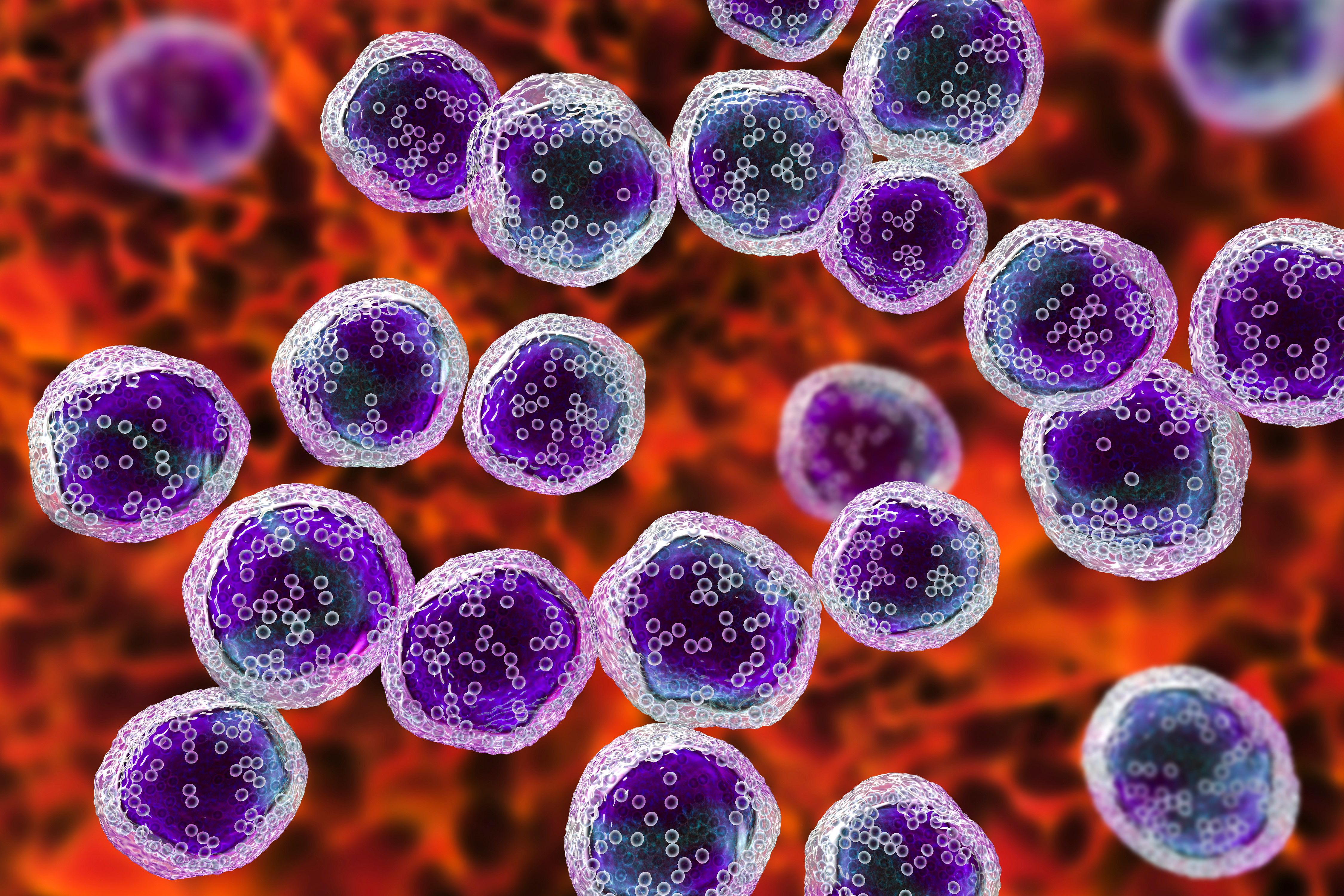Positive Topline Data With Nana-val in EBV+ PTCL
Combination therapy with nanatinostat and valganciclovir led to promising response rates among patients with Epstein-Barr Virus-positive peripheral T-cell lymphoma.
Illustration of lymphoma cells : © Dr_Microbe - stock.adobe.com

In patients with Epstein-Barr Virus-positive (EBV+) relapsed or refractory (R/R) peripheral T-cell lymphoma (PTCL), treatment with nanatinostat and valganciclovir (Valcyte; Nana-val) led to an overall response rate (ORR) of 50% and a complete response (CR) rate of 20% in the intent-to-treat (ITT) population, according to topline data from the phase 2 NAVAL-1 trial (NCT05011058).1
“Nana-val demonstrated an impressive clinical response in patients with relapsed or refractory EBV-positive PTCL with a generally manageable safety profile, including 1 patient who was able to proceed to allogeneic stemcell transplant and remains in response for over 8 months to date,” said Hung Chang, MD, professor of hematology, Linkou Chang Gung Memorial Hospital, Chang Gung University College of Medicine, Taoyuan, Taiwan, and principal investigator in the NAVAL-1 trial, in a press release. “The substantially greater clinical efficacy of Nana-valrelative to nanatinostat monotherapy suggests that both agents in the combination regimen are contributing to its anti-tumor activity as predicted by their mechanisms of action.”
A total of 20 patients, primarily with stage III to IV disease, were randomized to receive nanatinostat20 mg orally once daily for 4 days per week as monotherapy or in combination with valganciclovir 900 mg orally once daily for 7 days per week. After 6 weeks of treatment with monotherapy, patients who did not respond could cross over to the combination arm.
At a data cutoff of February 7, 2024, the ORR and CR rate were 10% and 0%, respectively, among the ITT population in the nanatinostat monotherapy arm. Five patients crossed over from the monotherapy to Nana-val arm, and 2 remain on treatment with stable disease.
Regarding safety, the profiles of the agents appeared to be tolerable. The most common treatment-related adverse events (AEs) occurring in both arms were thrombocytopenia, anemia, fatigue, decreased appetite, nausea, diarrhea, and weight loss.Most AEs were mild to moderate and manageable or reversible.
“Nana-val is emerging as a promising, generally well-tolerated, convenient all-oral treatment for patients with relapsed or refractory EBV-positive PTCL,” added Chang in the presss release.
About the Phase 2 NAVAL-1 Trial
NAVAL-1 is an open-label, phase 2 trial of Nana-val in patients with R/R EBV+ lymphomas.2 The study has an estimated enrollment of 140 patients across 14 countries.
ORR is the study’s primary end point, and secondary end points include duration of response, time to next anti-lymphoma treatment, progression-free survival, time to progression, overall survival, incidence and severity of AEs, and pharmacokinetics.
Patients with EBV+ PTCL, diffuse large B-cell lymphoma, and angioimmunoblastic T-cell lymphoma were eligible for enrollment. Patients needed to be at least 12 years old, weigh over 40 kg, not be eligible for high-dose chemotherapy with stem cell transplant or chimeric antigen receptor T-cell therapy, have an ECOG performance status of 0 to 2, and have adequate bone marrow function. Patients with a presence or history of central nervous system involvement or who had received systemic anticancer agents within 28 days were not eligible for participation.
REFERENCES:
1. Viracta Therapeutics announces positive topline Nana-val data from stage 1 of the NAVAL-1 trial in patients with relapsed or refractory Epstein-Barr Virus-positive (EBV+) peripheral T-cell lymphoma. News release. Viracta Therapeutics. April 15, 2024. Accessed April 15, 2024. https://tinyurl.com/4kwwmnh7
2. An open-label, phase 2 trial of nanatinostat in combination with valganciclovir in patients with Epstein-Barr Virus-positive (EBV+) relapsed/refractory lymphomas (NAVAL-1). ClinicalTrials.gov. Updated April 2, 2024. Accessed April 15, 2024. https://clinicaltrials.gov/study/NCT05011058
Examining the Non-Hodgkin Lymphoma Treatment Paradigm
July 15th 2022In season 3, episode 6 of Targeted Talks, Yazan Samhouri, MD, discusses the exciting new agents for the treatment of non-Hodgkin lymphoma, the clinical trials that support their use, and hopes for the future of treatment.
Listen
Early Data Shows Axi-Cel’s Potential in Treating R/R Primary and Secondary CNS Lymphomas
June 13th 2024Findings from a phase 1 trial presented at ASCO showed that axicabtagene ciloleucel was safe with clinical activity seen among patients with relapsed/refractory primary and secondary central nervous system lymphoma.
Read More